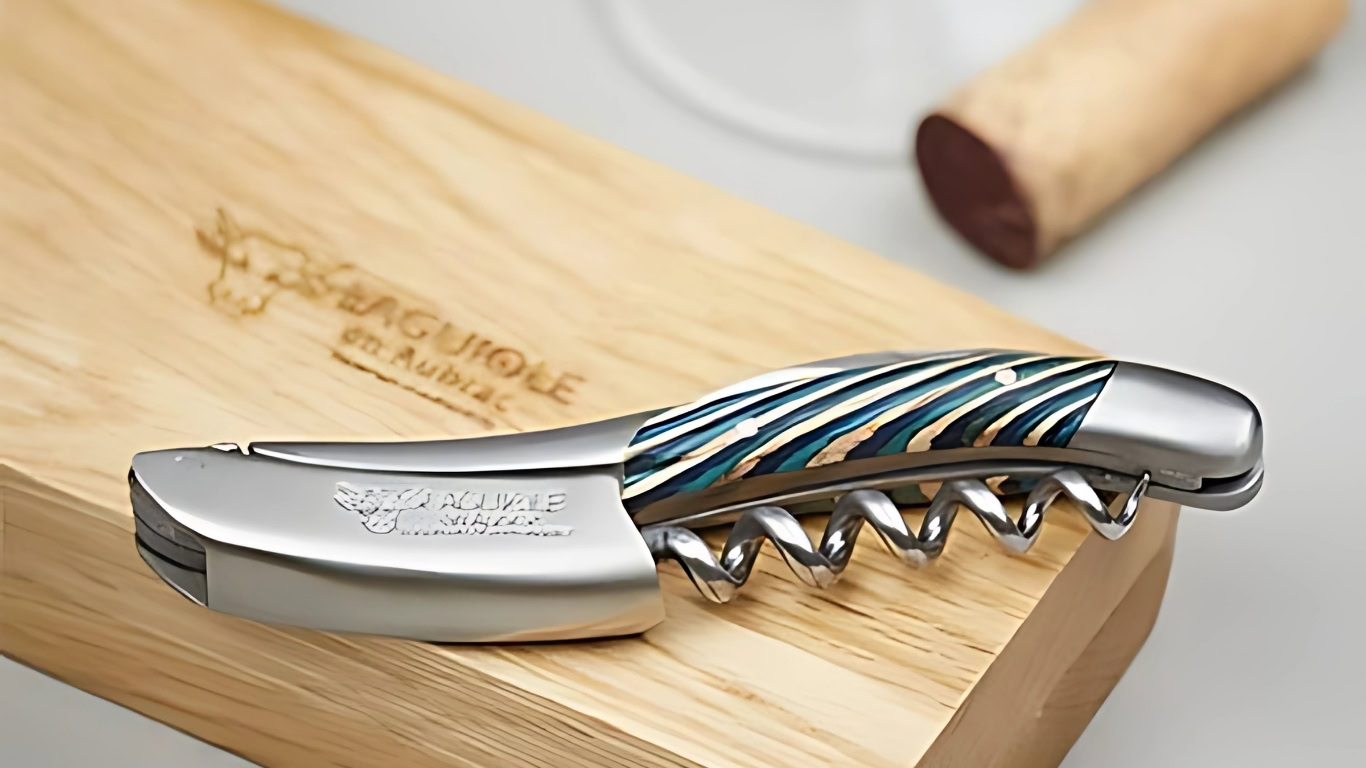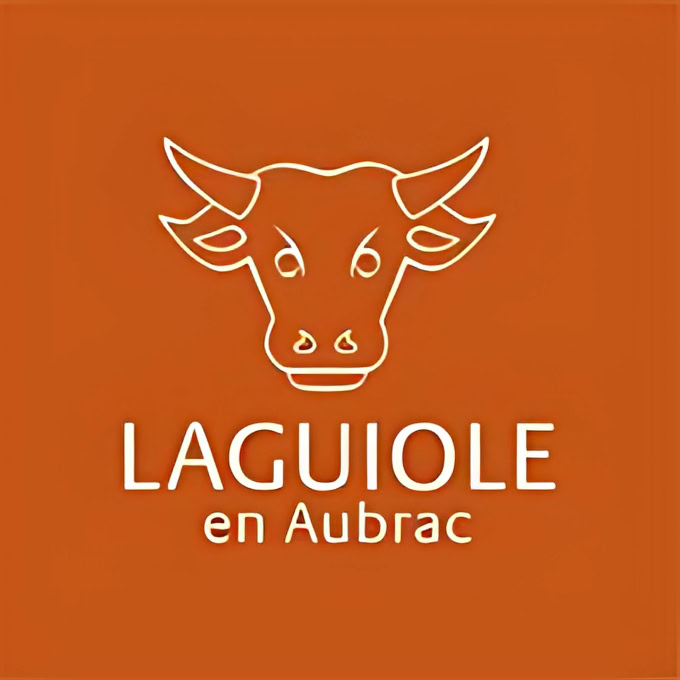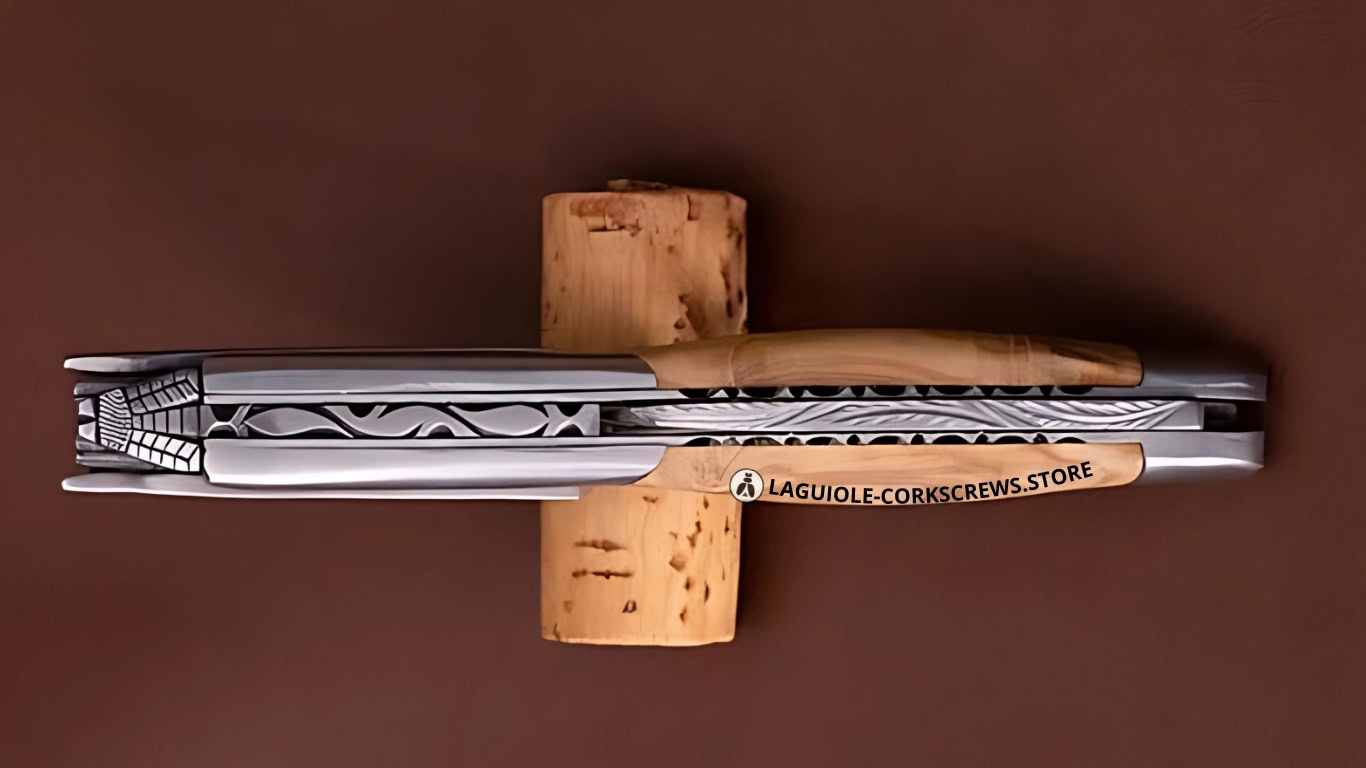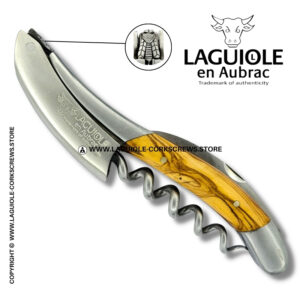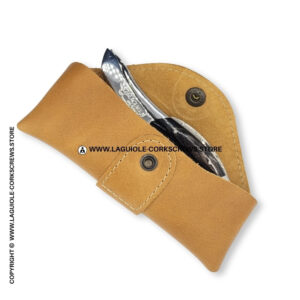Not all Laguiole corkscrews are created equal. Here’s how to avoid fakes and choose the real thing — handmade in France, for life.
The name “Laguiole” is everywhere — on websites, in gift shops, even stamped on cheap wine openers sold in supermarkets. But very few of those products have anything to do with the original Laguiole tradition, let alone the exceptional craftsmanship of Laguiole en Aubrac. For most buyers, it’s almost impossible to tell the difference — until it’s too late.
That’s because the word “Laguiole” is not a protected trademark. Anyone can use it, including manufacturers based thousands of kilometers away from France. The result? A market flooded with imitations, mass-produced tools, and misleading product descriptions.
So how can you make sure the Laguiole corkscrew you’re buying is the real thing — handcrafted, traceable, and built to last? In this guide, we’ll show you the clear, verifiable signs of an authentic Laguiole en Aubrac corkscrew, so you can shop with confidence and know exactly what you’re holding in your hand.
It Must Be Made in France — Not Just “French Style”
Many corkscrews sold under the name “Laguiole” have never seen France — let alone Aubrac. They are mass-produced in Asia, then branded with a French-sounding label, wrapped in faux-traditional packaging, and sold at a fraction of the price of a real handcrafted piece.
That’s because the name “Laguiole” is not legally protected. Anyone can print it on a box or a blade. But only a few manufacturers, like Laguiole en Aubrac, are actually located in France and follow the true artisanal tradition.
An authentic Laguiole en Aubrac corkscrew is entirely made in France — not assembled in France from imported parts, not just “designed in France,” but fully produced in the Aubrac region. The materials are sourced with care, and the assembly is carried out in the workshop itself. This is not branding. This is origin.
If the place of production isn’t clearly stated, or if the seller avoids the question, walk away. A genuine product will always say where it was made — and show pride in doing so.
It Is Always Handmade by One Artisan
Most industrial tools are made by a series of machines — or worse, by a sequence of workers each handling one part, over and over, like a factory line. One person inserts the screw, another attaches the lever, a third packs the item for shipping. The result may look finished, but it carries no personal craftsmanship and no responsibility.
A Laguiole en Aubrac corkscrew is the opposite of that system. From the first shaping of the handle to the final polishing and control, the entire piece is crafted by a single artisan. Not a team. Not a division. One person, from start to finish, signs off on every detail. → Why choose Laguiole en Aubrac
This approach guarantees not just continuity, but also excellence. The artisan knows how the materials respond, how the mechanism should feel, how the balance must behave in the hand. It’s a deeply human process — and it gives each corkscrew a character of its own.
If a product is described as “hand-assembled” or “workshop-made” without saying who made it, it’s likely part of an industrial process. A true Laguiole en Aubrac corkscrew comes with accountability — and a name behind it.
The Build Quality Speaks for Itself
You don’t need to be a craftsman to feel the difference. When you hold an authentic Laguiole en Aubrac corkscrew, the build quality is immediately obvious. The parts align perfectly. The movement is silent and fluid. The weight is balanced. And the materials — wood, horn, steel — have been shaped, not stamped.
The worm (or screw) is conical and forged, not drilled or machined. This shape protects the cork from tearing. The lever is hand-adjusted so it opens in one smooth motion, with no looseness or friction. There are no plastic inserts, no rattling parts, no shortcuts.
Industrial corkscrews often look fine in photos, but feel hollow in the hand. You may notice uneven joints, visible glue lines, or a mechanism that lacks precision. These are signs of mass production — and of a product designed to be replaced, not kept.
A Laguiole en Aubrac corkscrew is built to be used, admired, and passed on. Every detail serves a purpose, and the whole speaks of care, not speed.
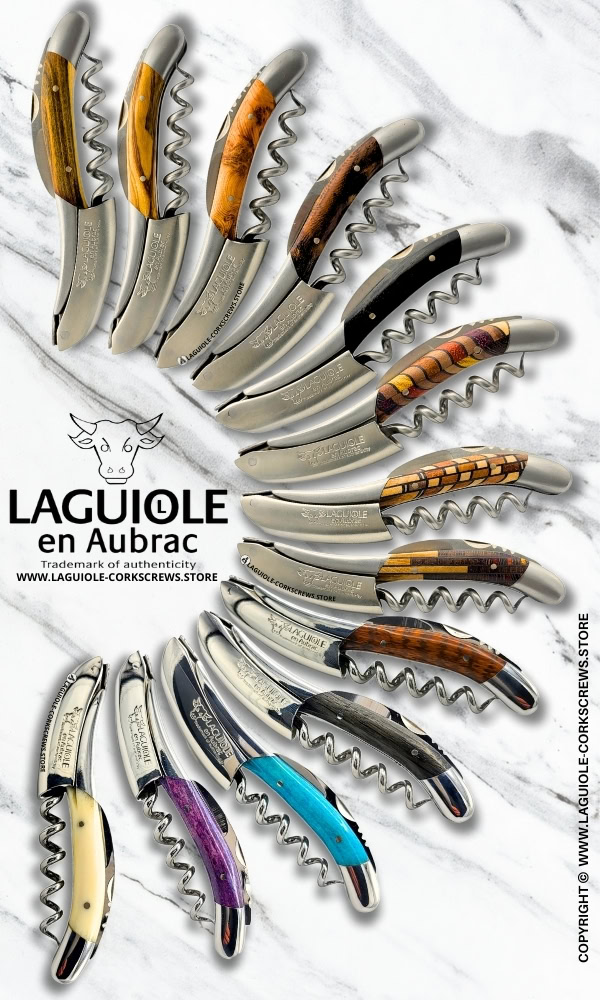
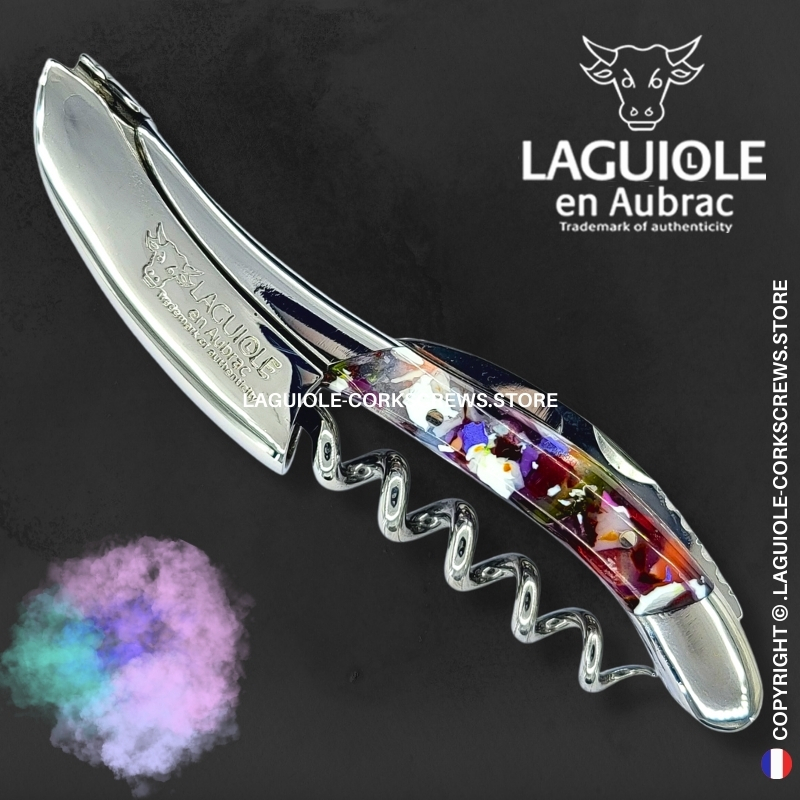
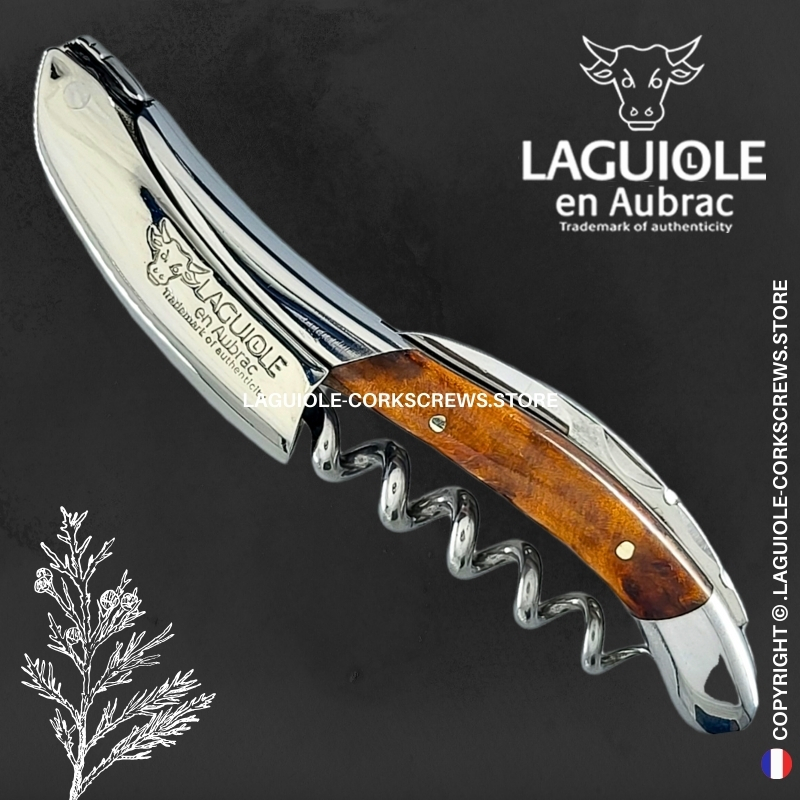
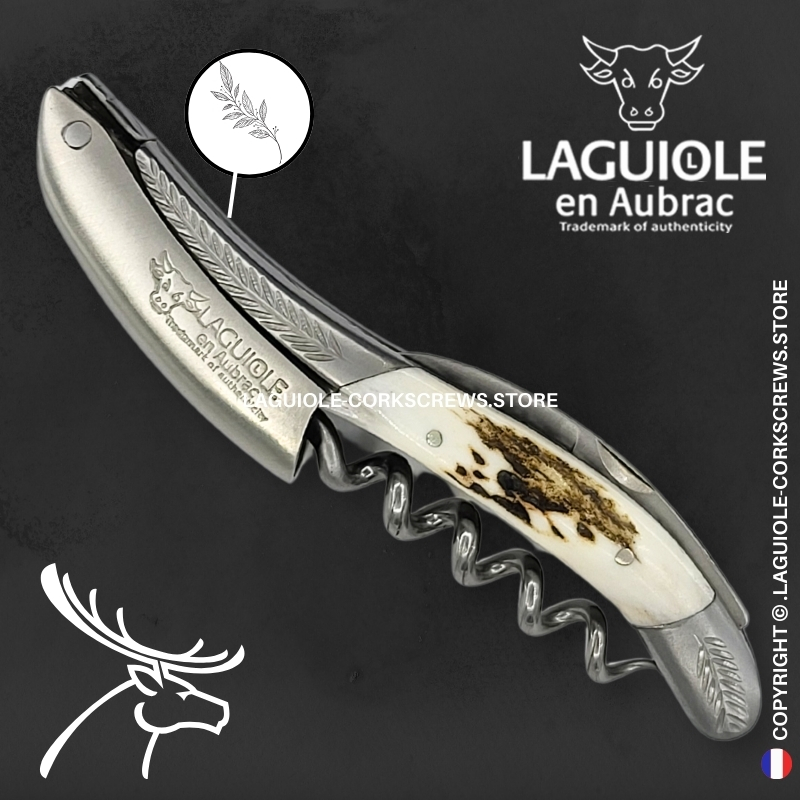
The Materials Are Natural and Traceable
A real Laguiole en Aubrac corkscrew is not just functional — it is made of noble materials that can be seen, touched, and verified. The handle is crafted from genuine wood, horn, or fossilized materials, never from plastic or imitation resin. The natural textures vary from one piece to another, giving each tool its own identity.
These materials are chosen not for convenience, but for beauty, durability, and authenticity. Olivewood, juniper, ebony, buffalo horn — all are stabilized and finished by hand to preserve their integrity. No varnish hides the surface. What you see is the real substance, polished and adjusted without coating.
In industrial models, handles often use composite blends or imitation materials. They may look uniform, but they feel generic. Worse, they degrade with time, while natural materials age with grace.
If the product doesn’t state clearly what it’s made of — or if all models look identical — it’s likely synthetic. Real Laguiole en Aubrac corkscrews celebrate material honesty.
It Comes with Proof
A genuine Laguiole en Aubrac corkscrew doesn’t just look right — it comes with proof. Each piece is delivered in a presentation box and includes a certificate of authenticity. This document confirms not only the origin of the piece, but also the fact that it was entirely made in France, by hand, in the Laguiole en Aubrac workshop.
Every Laguiole en Aubrac corkscrew also bears the signature of the artisan who assembled it. This signature — engraved discreetly — is your guarantee that the piece was made from start to finish by a single craftsperson. It is a personal commitment to quality and accountability.
In contrast, counterfeit or anonymous corkscrews typically arrive in generic packaging, without any indication of origin. No certificate. No signature. No traceability. Just a logo, often printed on the lever, that tries to look convincing.
Before you buy, ask yourself: where is the proof? If the seller doesn’t provide clear documentation, or if the product seems “Laguiole” in name only, it probably is. Authenticity is never assumed — it is guaranteed.
Why Buying from the Right Place Matters
Even with all the right information in hand, choosing where to buy is just as important as choosing what to buy. Many so-called Laguiole corkscrews are sold through third-party platforms or shops that use vague product descriptions, borrowed imagery, or misleading labels. Some list items as “made in France” without any real traceability. Others rely on the word “Laguiole” to imply heritage, without any connection to the region, the craft, or the name Laguiole en Aubrac.
Buying from a verified source is the only way to be sure. On our site, every Laguiole en Aubrac corkscrew is carefully selected, photographed, and described. Each one is handmade, engraved by the cutler, and shipped from France — with full documentation included. No ambiguity. No rebranding. No factory shortcuts. → The Manufacture
When it comes to craftsmanship, origin matters. But so does trust. That’s why where you buy is part of the authenticity.
Craftsmanship You Can’t Learn in School
There is no knife-making school that teaches the Laguiole tradition. Every artisan at Laguiole en Aubrac is trained directly in the workshop, through months of observation, repetition, and personal mentorship. It’s a process built on transmission — one craftsperson passing down gestures, intuition, and rigor to another. Each finished corkscrew is not just a product of skill, but of cultural heritage shaped by human hands.
Lifetime Guarantee — With Respect for the Object
All Laguiole en Aubrac corkscrews are backed by a lifetime guarantee covering any manufacturing defect. It’s a testament to the confidence we place in the quality of our work. However, this guarantee applies only to items used with care and under normal conditions. A tool designed to last a lifetime deserves to be treated with the same respect it was built with.
Conclusion
Recognizing a real Laguiole en Aubrac corkscrew isn’t about spotting a secret mark — it’s about knowing what to expect, and refusing to settle for less.
Origin, craftsmanship, materials, finishing, documentation — all of these are visible, verifiable signs of authenticity. When just one is missing, there’s reason to doubt. When all are present, you know you’re holding more than a tool. You’re holding something that was made with care, by someone who stands behind it.
In a market full of noise, shortcuts, and copies, choosing a genuine Laguiole en Aubrac corkscrew is choosing clarity. And that clarity makes the object — and the moment it serves — all the more meaningful.

